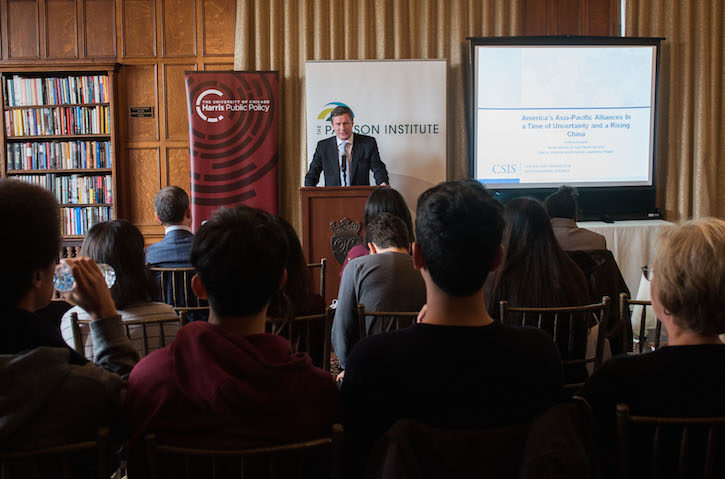The Paulson Institute welcomed national security expert Andrew Shearer for a talk on America’s Asia-Pacific alliances as part of the Institute’s Contemporary China Speaker Series at the University of Chicago. As National Security Adviser to Australian Prime Ministers John Howard and Tony Abbott, Mr. Shearer played a leading role in Australian foreign, defense, and counter-terrorism policy-making. In May 2016, he joined the Center for Strategic and International Studies (CSIS) as a senior adviser on Asia-Pacific Security and is currently the director of a new CSIS project on Alliances and American Leadership.
In his talk, Shearer aimed to provide “an alliance perspective on the rise of China and security issues in the region as they’re evolving.” He noted the current geopolitical moment as a particularly good time to be looking at American strategy in Asia and the role of the alliances in executing that strategy given the changing nature of China’s presence in the region. America’s Western Pacific alliances initially took shape against the background of a debate in the U.S. over what the geographic and normative perimeters should be in Asia for defending America’s security interests. However, Shearer notes that these alliances are being stressed and strained today in a way that has not been seen in several decades. These stressors to America’s alliances have manifest as U.S.-allied countries such as the Philippines, Thailand, South Korea, and Australia face economic and political pressure from China aimed at “blunting the ability of the U.S. to project power into the Western Pacific and to implement its security commitment to its allies,” he said. Shearer also noted that China wants to “foment doubt on the part of those allies” as to whether or not the U.S. can continue to project military power and security in the region.

America can’t afford more “unforced errors” like the Trans-Pacific Partnership (TPP) debacle, Shearer explained. He urged that the U.S. can’t be complacent in its address of China’s rise to power, noting “China is mounting a sophisticated, full-spectrum challenge to American power and influence in the region…the likes the alliance system has not seen.” While Shearer observed the U.S. presence in Asia is “long on military and short on just about everything else,” he also noted that the U.S. alliance system, as it becomes more multi-lateral and more capable, is also well-positioned to play a pivotal role in maintaining a favorable balance of power and “deterring adventurism.” Shearer concluded his talk by quoting a fellow CSIS expert Michael Green, saying, “Only when U.S. military power is firmly aligned with free and open economic policies and strong and open American ideational leadership does American strategy tend to succeed in Asia… and your allies need it to succeed in Asia today.”



